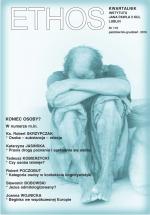JEZUS ODMITOLOGIZOWANY? Antyewangelia według José Saramago
A Demythologization of Jesus? The Anti-Gospel According
to José Saramago
Author(s): Sławomir BobowskiSubject(s): Systematic Theology, Pastoral Theology
Published by: Katolicki Uniwersytet Lubelski Jana Pawła II - Instytut Jana Pawła II, Wydział Filozofii
Keywords: historical Jesus; Jesus of the Gospels; the sacred; atheism; theism; novel; freedom; self-fulfi llment; mercy; love
Summary/Abstract: The dispute over Jesus, which is also a dispute over the existence of the sacred reality, has continued since the age of Enlightenment. The very fi rst works intended to demonstrate that Jesus was a merely historical fi gure were created in the early nineteenth century. Until now, thousands of books have been published all over the world proving the validity of this claim, and other thousands in order to abolish it. At the beginning of the twentieth century, the ‘debate’ in question was transferred to the domain of literary fi ction. Side by side with novels intended to evangelize the readers, such as Jim Bishop’s The Day Christ Died (1957), there appeared several novels engaging in a polemic with the Gospel tradition, some of them even meant to compromise it. Among them is José Saramago’s The Gospel According To Jesus Christ (1991), an openly secular novel, only subtly, however, undermining the sacred tradition. The author succeeds in pointing to some of its weaknesses (or quasi-weaknesses), such as: (1) the inaccuracy of the message of the Gospel, (2) the overtly oppressive attitude of Christianity towards sexuality, hindering the recognition of one’s own identity (in the case of the novel the person suffering this oppression is Jesus), (3) too rigid a separation of good and evil, which is perceived from the secular, rational-empirical perspective as artificial and incompatible with the liquid, free-floating reality lacking sharp boundaries. The fi ctional Jesus rebels against God, the Father, and, discouraged by numerous ‘fallibilities’ of the divine project, refuses to carry his yoke. However, having focused on the personal growth of his protagonist, on his quest for freedom and self-fulfi llment, the author ignores the most signifi cant elements of the story of Jesus, namely, the call for mercy, the commandment to love one’s neighbor, and the call not to be focused on oneself.
Journal: Ethos. Kwartalnik Instytutu Jana Pawła II KUL
- Issue Year: 29/2016
- Issue No: 4
- Page Range: 221-244
- Page Count: 24
- Language: Polish
- Content File-PDF

